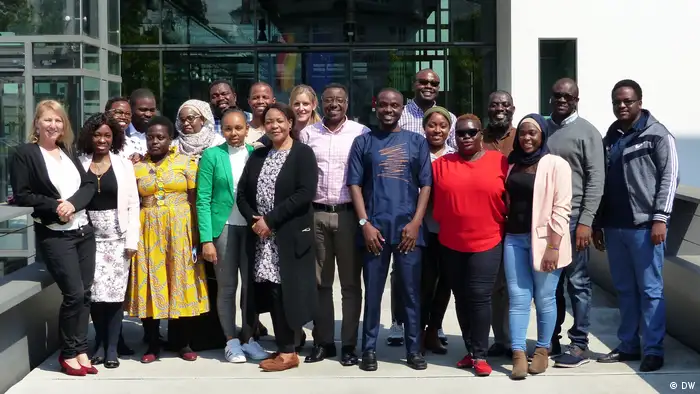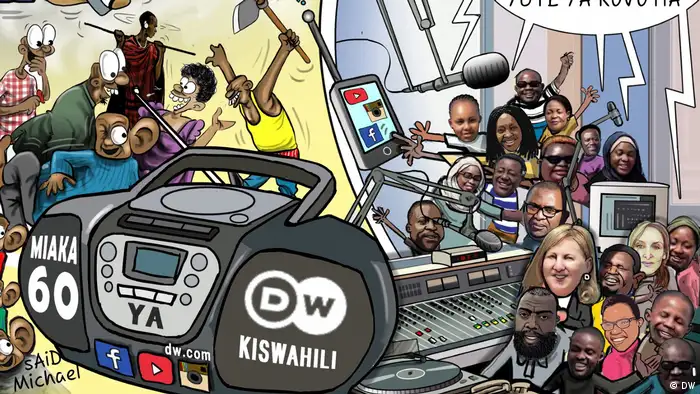PRESS
DW's Kiswahili Service: 60 years of broadcasting
In February 1963, DW's first DW Kiswahili broadcast went live on shortwave. Today's team uses a variety of multimedia channels to reach its audience.
DW's Kiswahili service, which is celebrating its 60th anniversary, has received a lot of recognition for its work. Thousands of comments every day from its young, politically-interested audience — from East Africa and the Democratic Republic of Congo — highlight the ongoing need for reliable information.
"For us in East Africa, DW is the most trustworthy broadcaster in Kiswahili," Richard Charles from Tanzania wrote in a Facebook post. "We feel well informed about what is happening in the world, diverse, balanced and objective."
His compatriot Dathius Deus echoed his sentiments: "I appreciate your balanced and objective reporting."
"DW Kiswahili is the mother of all radio stations in the world," Doctor Falloux from Kalemie in the Democratic Republic of the Congo wrote. "I am a loyal follower of your news and reports."
"You have set high standards for other media, we love DW," said Robert Mwenda from Songea, Tanzania. "They always bring us up to date."
Before the Kiswahili service went on air in 1963, DW for Africa could only be heard in European languages. Many African states at the time were fighting for freedom from the colonial powers — or were about to become independent.
Why did DW choose Kiswahili?
Today's Kiswahili team looked for the reasons why DW started broadcasting in Kiswahili. After looking through the archives, they were none the wiser. It was only after speaking with former colleagues that they got some clarity.
In 1963, a young student named Bernd Heine worked for DW and suggested starting a program in one of Africa's most widely-spoken languages because that was the only way DW could reach a wider audience.
"The beginnings of the Kiswahili program as a translated news bulletin now seem antiquated and out of date," said Claus Stäcker, Director of Programs for Africa.
"But the philosophy behind it was: We are only perceived as a German voice through regional languages. After 60 years, DW Kiswahili has long since arrived in the digital age, competent, interactive, on an equal footing with users, listeners and viewers."
The Kiswahili service started with a five-minute news bulletin and has since expanded to the three hours of radio we hear today. The program — with its diverse range of social media — has almost 2 million followers on Facebook and almost 1 million on Instagram.
"Most of the content is created in the target area, the correspondents are our support and the efficient media mix of radio, social media and TV has become the reference system for quality journalism in East Africa: what DW reports on its channels is authentic, well researched, tested, reliable and stable in value," Stäcker pointed out.
"This also scores points with young people, whom we mainly reach on mobile phones today. Thousands of user comments show us every week that our path is recognized in the region."
In the early years, most journalists came from Tanzania. Today's editorial team is multinational and comes from six African countries: Tanzania, Kenya, Rwanda, Uganda, the Democratic Republic of Congo and Burundi.
The large network of correspondents across all regions of the target area enriches the content with video on demand (VoD) and current reports. The focus: Human rights, freedom of expression and topics often considered taboo.
"We are in a permanent process of change," emphasized the head of the Kiswahili service, Andrea Schmidt.
"We are adapting to rapidly changing media use and the habits and requirements of young people in order to reach young audiences and communicate with them. No international broadcaster has as many youth programs as DW Kiswahili. Seven youth programs that are mainly produced by young, experienced correspondents with and for the youth in East Africa."
Wide reach in a constantly growing language
Together with DW's Hausa service, Kiswahili ranks fourth among the DW languages with the widest reach.
In addition to three hours of radio for East Africa and the Great Lakes region, the Kiswahili team offers a wide range of VoD. Political caricatures on social media channels regularly trigger heated discussions in the region.
DW Kiswahili has been on the cutting edge of new format development for DW. Interactive audience participation using SMS, for example. And the popular political discussion show Maoni, which often addresses taboo topics. The radio drama series Duniani kuna Mambo, Kiswahili has provided a good template for the successful "Learning by Ear" productions.
A third of Tanzania's population listens regularly to the service in Kiswahili — which, experts say, is one of the world's fastest growing languages.
- Date 31.01.2023
- Feedback: Send us your feedback.
- Print Print this page
- Permalink https://p.dw.com/p/4MvLi
- Date 31.01.2023
- Send us your feedback.
- Print Print this page
- Permalink https://p.dw.com/p/4MvLi



